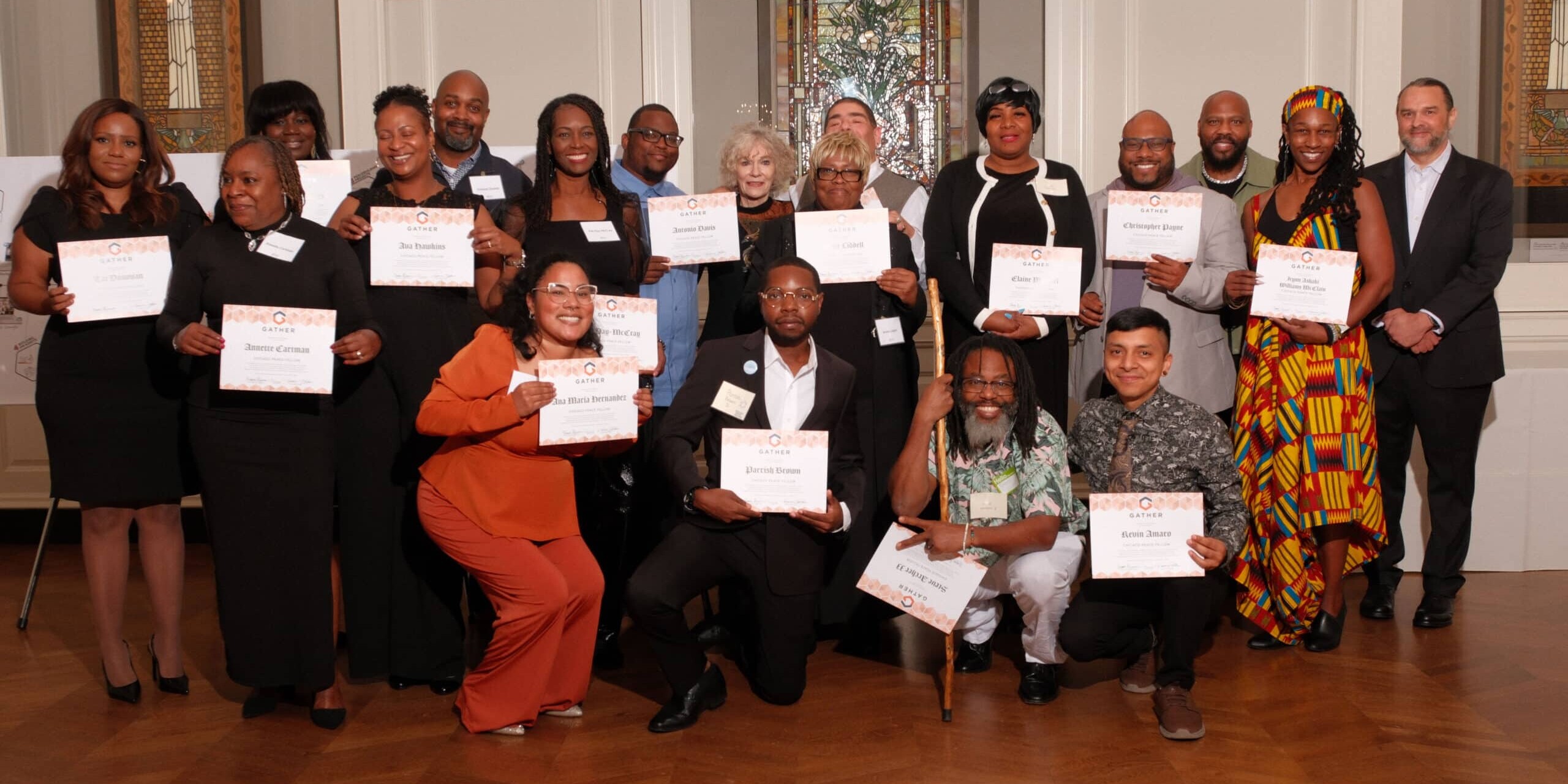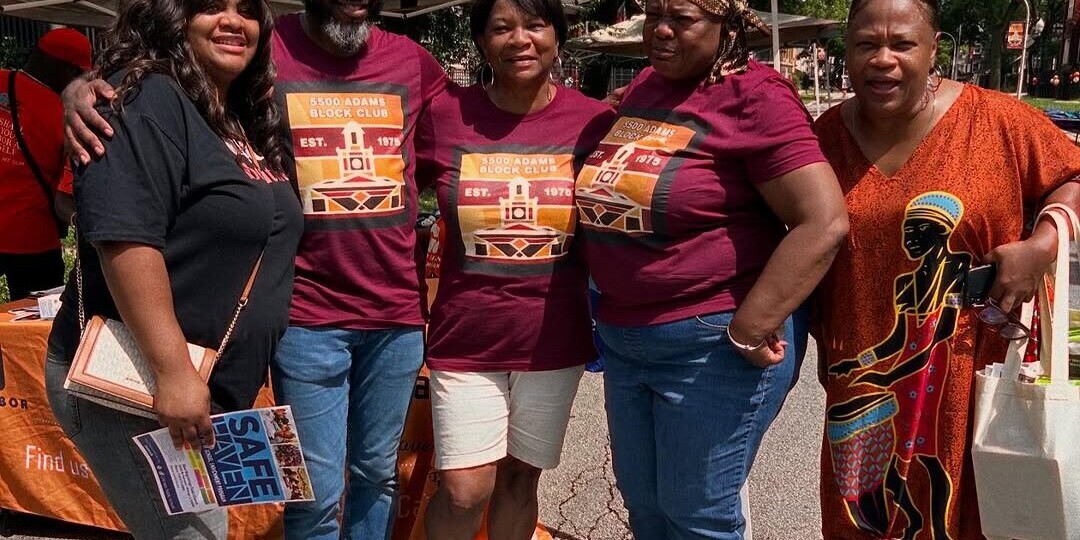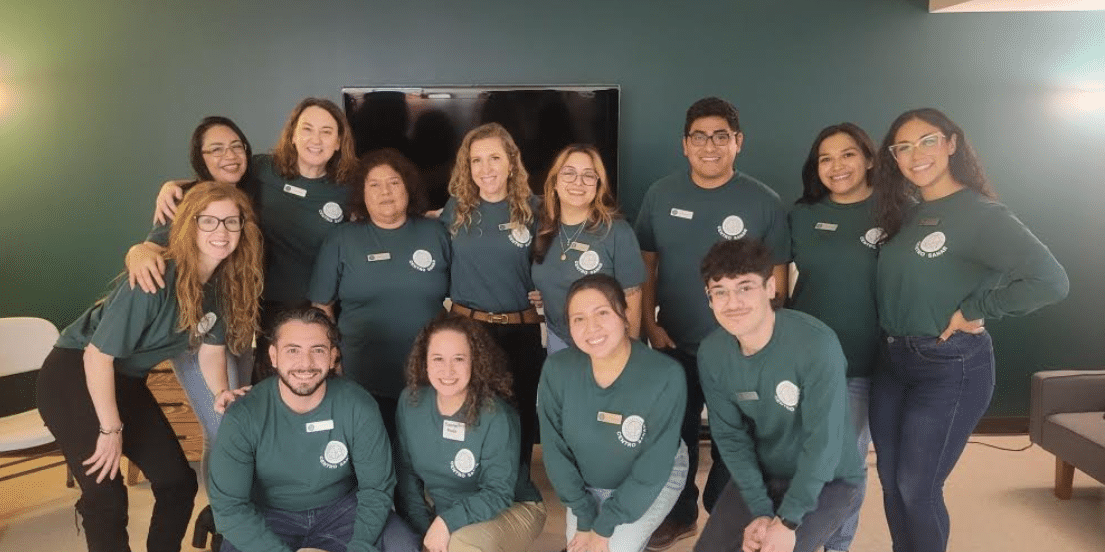
On July 24, a delegation of Chicago Peace Fellows presented their work together thus far to a large meeting of 2019 grantees as well as the funders of the Partnership for Safe and Peaceful Communities, a coalition of more than 40 Chicago philanthropies and donors who have provided grants to community groups trying to reduce violence in disproportionately affected neighborhoods on the South and West sides.

The Peace Fellows were part of the agenda for the conclave at the Hatchery, a spacious new not-for-profit on the West Side that provides training as well as modern facilities to aspiring food entrepreneurs, including equipment for cooking, freezing and storage as well as events.
Attending on behalf of the Goldin Institute were Fellows Maria Velasquez, Robert Biekman, Jacqueline Moore, Pamela Butts, Jamila Trimuel, and Gloria Smith along with artist Cecil McDonald, who is documenting the program in video and photography, Lisa Dush, a professor at DePaul University who is conducting a professional evaluation of the GATHER software and curriculum, and Goldin staff members Oz Ozburn and Burrell Poe.
Burrell began with a brief summary of the genesis of the Peace Fellows, explaining that Goldin staff conducted extensive interviews with previous grantees of the Partnership to find out what they needed and how a curriculum could serve them. All of the Peace Fellows are previous grantees of the Partnership, and many have received current grants as well.
Each of the Fellows then took turns presenting different aspects of the program, interjecting their personal experiences and observations at appropriate moments along the way.
Maria described the strong sense of camaraderie among the Fellows, and extolled the practical benefits of collaboration and sharing:
[quote]I’m just so happy to be a part of this cohort, because it makes our communities strong. — Maria Velazquez[/quote]
Robert explained that he was thrilled to discover that the Peace Fellows curriculum was focused on action, rather than theory, as well as accountability that came through honest collaboration and support. In his work as a pastor and organizer, Robert has participated in many different programs and fellowships, but he often lost interest as they proved impractical or didn’t sufficiently involve community residents. He remained highly involved with the Peace Fellows, however, because it provides access to places and people who would not be available otherwise. In particular, the curriculum has allowed him to continue the connections he established with young men in different stages of the criminal justice system beyond the short terms of the grants from the Partnership. He has even been able to build bridges between different groups working on violence-related issues from multiple angles and involve them in efforts to craft solutions.
[quote]Using the tools that GATHER has provided in the curriculum and also working with Peace Fellows, it has allowed me to take that moment and make it into a movement, to go from a place where we are doing community outreach to do community engagement, to be able to build the kind of relationships that provide long term sustainability for the efforts we are engaged in. — Robert Biekman[/quote]
Robert continued, “GATHER has allowed me to create a community of practice with all of those who are directly impacted by the issues of our community, to gather us together to see what are the real key issues and most importantly to invite them to participate in making the changes that are necessary because those who are closest to the problem often have the best solutions.”
“So often, we do this work, and we do it by ourselves, and for me what this has provided is a watering hole where I’m able to go in the midst of all the other work we do in order to drink deeply with others who are doing the work we are doing. That gives us a personal sustainability to each of us.”
Gloria said that the individual Peace Fellows are all part of broader group of community-based organizations that often work together. She recently moved to Chicago after the death of her brother, Phillip Jackson, and took over as executive director of the organization he founded, the Black Star Project. She has hit the ground running, maintaining and even expanding partnerships and initiatives, and on one day, Gloria found that she had three commitments for the same day, so she asked another Peace Fellow, Velvian Boswell, to stand in for her. She was greatly appreciative for that level of support from the Peace Fellows.
[quote]“We’re all connected. We’re all a network of hope. — Gloria Smith[/quote]
Pamela Butts echoed the sentiment that the collaboration with her peers – people with similar experiences in community work – has been extremely rewarding: “Peace Fellows has given us an opportunity to develop relationships, resources and opportunities we never dreamed of.”
[quote]These are folks who have been out there on the front lines for years just doing the work just because people have needs. — Pamela Butts[/quote]
Jamila said she had participated in multiple fellowships and residencies, and wasn’t inclined to apply for another one, but when she received the e-mail from the Goldin Institute during a college tour with the girls in her program, she thought the Peace Fellows would be different. She was intrigued by the prospect of working with other organizers in Chicago:
[quote]I wanted to connect more with people on the ground. It’s hard to find that kind of learning community here in Chicago. — Jamila Trimuel[/quote]
“I took a pause (to check out the Peace Fellows) because I realized for the first time I would be part of a fellowship program where there would be people who are on the ground who are from communities, who love Chicago like I love Chicago and who want to ensure that Chicago is a better place to live and to serve.”
Jamila recounted several emotional meetings, including one where the Peace Fellows advised the staff at the Field Museum of Natural History about the future presentation of an exhibit with a racist and colonialist past. On another group outing to a neighborhood, the Peace Fellows saw a police action, while across the street children were playing, a sad juxtaposition that reflected the realities for too many families in Chicago.
“We know we’re here to stay we’re here to make a true, lifelong difference in our communities and that’s what’s so special about Chicago Peace Fellows,” Jamila summed up.
Jacquelyn explained that the Peace Fellows had agreed on a set of guiding principles that were used to evaluate all proposals for summer projects, which would be supported by a fund assembled by the Goldin Institute. Among other principles, the group agreed the summer projects should promote peace, embrace new challenges and accountability, and include authentic community participation.
Ultimately, the group approved eight different projects, all of which incorporate multiple principles, ranging from information fairs to help ex-offenders expunge their records to a retreat for the Fellows to practice self-care and reflection.
“The projects are all very different. Collectively, they serve the entire city, are a great opportunity to show off what we’ve learned while we’re promoting peace and giving all of you guys the opportunity to partner with us,” Jacquelyn said.









